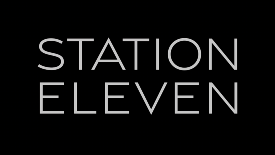Over the past month I got caught up on two very different but very intriguing shows on HBO Max. Do you want a contemplative tale about a not-so-dystopian post-pandemic future? Or a slice-of-life queer dramedy that deals with gender expression, family dynamics, and self-acceptance? Come on, you know you want both.
Station Eleven: Based on the novel by Emily St. John Mandel, this is the story of a traveling theater troupe in the US, twenty years after a pandemic has decimated the majority of the global population. Yeah, I know this sounds grim in 2022, and maybe you don’t want to subject yourself to any pandemic fiction when we are still living in a pandemic reality. But the show is immensely intriguing, offering up a startlingly decent portrait of humanity and how we might all just settle into our new normal without turning into zombie hordes.I’ll admit, my main takeaway from watching this show has been that I immediately want to read the novel in order to flesh out some of the sketchier aspects of the show where plot points kind of came and went without too much background. But each week, this show offered up major vibes. It deserves to win a host of technical Emmys for achievement in costume design, production design, cinematography, and music, because here is a show that celebrates human creativity and the arts. Most post-apocalyptic tales are consumed with the base human struggles of survival, and we do get that somewhat when the show flashes back to the initial days of the pandemic when people were dying all over the place and supermarkets were raided for all available supplies. But in the flash forwards, we see a much gentler vision of the new society that has been established, where people honor the “before” times by putting on Shakespeare plays and singing karaoke to Lisa Loeb.
The show is also beautifully scripted by creator Patrick Somerville and his team of writers. There are multiple story arcs that span geographies and time periods, and at times it was a struggle to keep things straight (another reason I’m looking forward to reading the book). But if you immerse yourself in the show (and now that it’s all available, if you just straight up binge it) you are in for a real treat of watching how those arcs collide or complement each other as we go through this epic tale. The cast is phenomenal, with special kudos to Himesh Patel who is doing a stellar American accent (and also does good ABCD Hindi when called upon to do so), and Mackenzie Davis who has to channel all the emotion of her younger self as well as the woman she has grown into over the course of this dystopian future. I didn’t think this show was as feel-good as many critics were claiming (maybe the fact that the pandemic on this show is way worse than Covid made people feel better about our real pandemic?), but ultimately, it was gorgeous to look at, and had clever story elements that captivated me. Each week, I had to stay glued to my TV lest I forget a name or some minor detail that would be recalled in a later episode, and maybe that’s this show’s greatest accomplishment. In a world full of second screening and distractions, it demanded your attention and got you to watch some Shakespeare.
Sort Of: Co-created and written by Bilal Baig and Fab Filippo, Baig stars in this show as Sabi Mehboob, a non-binary first generation Pakistani-Canadian who uses they/them pronouns and is trying to sort out what exactly they want from life. Over the course of the first season’s eight episodes, we will follow the evolution of Sabi’s relationship with their mom (played by the incredible Ellora Patnaik who embodies the typical immigrant Pakistani woman who is slightly regressive but trying to become more woke now that her husband is off in Dubai and exerting less control over the household). This particular story arc is both sweet but fraught, because while Sabi's mom believes she raised a son, she now has to come to terms with what it means to have a non-binary child and how she will navigate this among her wider immigrant Muslim community.The main story arc, however, concerns Sabi’s employers. Sabi works as a nanny to two young kids, and when their mom is in a terrible accident and ends up in the hospital, Sabi becomes even more of a crutch for the family to lean on, even though they and the father might clash over what constitutes good parenting advice. Along the way, you will be introduced to Sabi’s best friend 7ven (Amanda Cordner), and their aspirations to live their best queer life in Berlin. Which brings us to the central conflict of whether Sabi is ever going to also make a drastic change or continue to be buffeted along their current path of least resistance.
This show is very funny, but it is a dry, sarcastic kind of humor, precisely the kind I relish. This is not your stereotypical sitcom that’s trying to get big laughs. Instead, this is sly and observational, a sort of world-weary comedy delivered by someone who is trying to make their way in the world and wishes all the humans around them wouldn’t make it so difficult. And the show is genuinely heartwarming and affirming about what the journey to queer acceptance looks like. Many people in Sabi’s life get it wrong, but the simple act of someone asking them what their pronouns are is all it takes for Sabi to realize this a question they’ve never even dared to ask themself. There is nothing on TV that is quite like this show, so please give it a shot. Each episode is less than 30 minutes long and you can polish it off in an afternoon, but you’ll be thinking about it for a lot longer once you’re done.


No comments:
Post a Comment